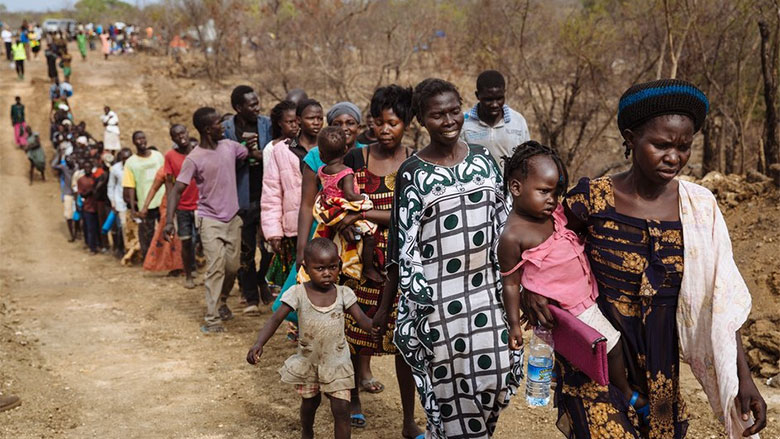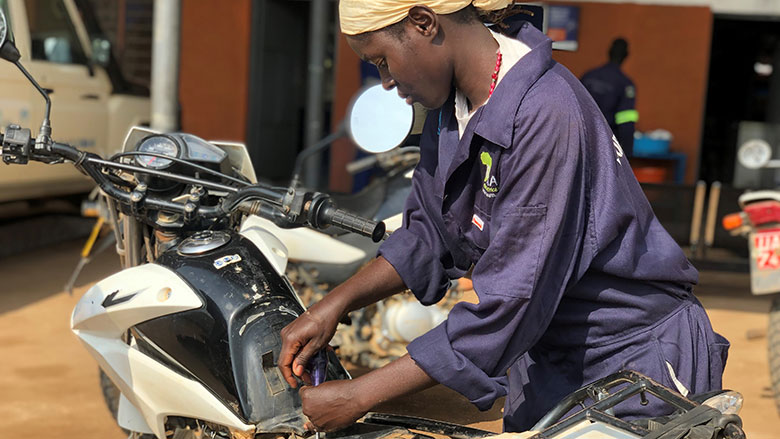The Project for Capacity Development of Local Government for Strengthening Community Resilience in Acholi and West Nile Sub-Regions (WA-CAP) aims at further strengthening planning and implementation capacity of the local government officials in all of the 17 districts in Acholi and West Nile Sub-regions. The project has the component which aims at enhancing livelihood of the community through Community Driven Development approach. Some of the community members selected the use of oxen and ox-ploughs to improve cultivation and enhance their livelihood.
Economic empowerment of community groups and building stronger relationships amongst their members is very important in reducing their vulnerability status and also ensuring complete economic recovery from the long-lasted insurgencies. 32 community groups from 16 Sub-Counties of Acholi Sub-Region are throwing away their labour-intensive hand hoes in favour of oxen to plough their land. The membership of the groups is inclusive enough to take care of different categories of persons in the communitysuch as widows, persons with disabilities, elderly, youths, HIV affected Households, and war-affected persons.
According to Mr Oyoo Fabio, chairperson of Owir Pii Lukeme Farmers’ Group in Omiya Parcwa, Sub-County, Agago District, 1.5 acres of land can now be tilled in a day as opposed to hand hoes that would take about two weeks for the same piece of land. He added that they were able to plough 38 acres of group garden and 30 acres of individual gardens last season alone.
JICA WA-CAP has supported 32 farmers’ groups from Acholi Sub-Region with farm equipment as well as the necessary hands-on trainings on how to take good care of their animals to plough the land in 2016 and 2017. In 2017 and 2018, 36 groups from West Nile Sub-Region as well is being supported with such equipment and trainings for livelihood improvement (not limited to animal traction). In case of the animal traction, each group receives 3 pairs of oxen, 3 pieces of ox-ploughs and a spray pump in addition to the training support rendered to the groups by Community Development Officers (CDOs) in their respective Sub-Counties.
Before the oxen can be used for farm work, they are trained by an experienced member within the group and also other group members equally learn during the ox-plough training process. The trainers are normally from the group and sometimes out-sourced from the community at a reasonable cost in situations whereby the group does not have experienced members.
The group works together to plough their respective tillage plots. This model greatly increases the acreage of land that is tilled. In addition, it enables timely planting and ploughing to deeper depths hence crop yields are increased significantly.
WA-CAP promotes a participatory approach to procurement amongst the groups by involving the groups representatives i.e. at least three members from each group with good knowledge and experiences on ox traction in the procurement process by facilitating them to go to the Animal market in Amach, Lira District to select animals of their desired choices (that are of good quality and ideal for ploughing) visa vie other factors considered.
Also, cost sharing is being emphasized amongst the groups which aspect will help to ensure that the financial burden of operation and management of the project does not fall too heavily on one stakeholder. It will also ensure a greater sense of commitment and ownership by the groups. It is true that community groups do not have enough funds to share the financial burden but in such cases funding ‘in kind’ (time, personnel, local materials etc.) provides a mechanism to the contribution of resource-limited groups, this has proved successful at the community level where farmers contribute labour, land and other relevant materials that are available to them and relevant to the project.
Community-Based Approach
JICA WA-CAP has moved away from a service-delivery approach to increased focus on empowerment and community-led approaches through basic active community participation that is always facilitated and encouraged by CDOs.
JICA works in partnership with lower level Local Government structures, CDOs in particular, to conduct groups’ appraisals/ assessments at local level by taking into consideration the 4 aspects (suitability of the group, appropriateness of the project applied for, management/leadership capacity and technical capacity of the group). The results screen their development needs which are discussed further during the next stage. Community participation (at least 80%) is encouraged throughout the process to promote commitments, ownership and enhance transparency, sustainability.





























